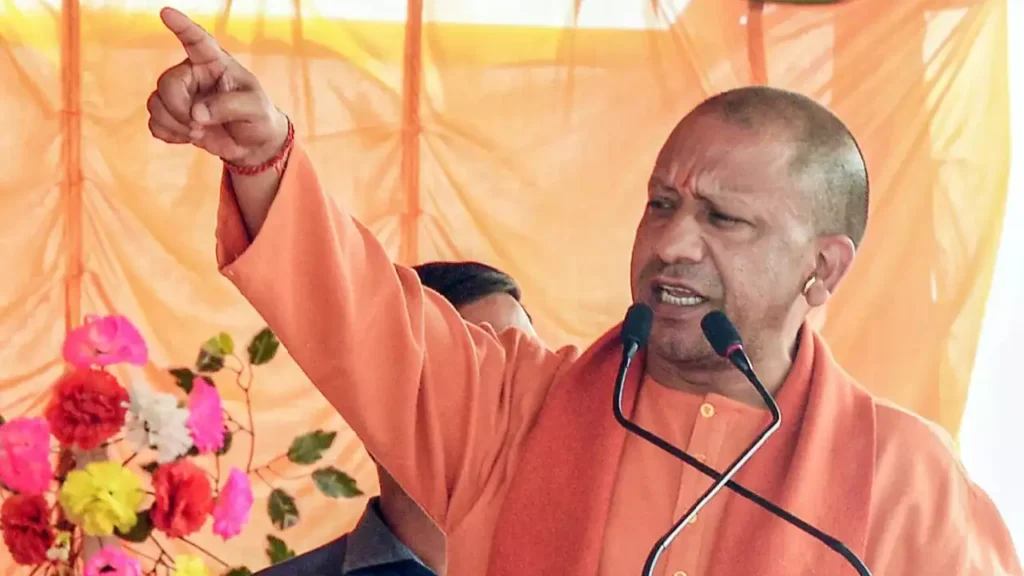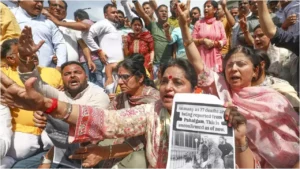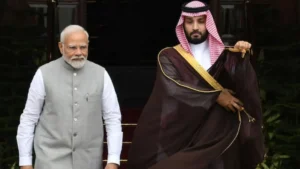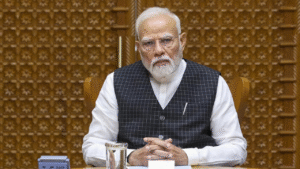Yogi Adityanath Comments on Mathura Land Dispute

In a significant development that has once again brought the Mathura land dispute to the forefront, Uttar Pradesh Chief Minister Yogi Adityanath has made important comments addressing the long-standing issue surrounding the land in the city of Mathura. The dispute, which involves both religious and legal complexities, has been a source of tension for decades, and Adityanath’s remarks have sparked widespread discussions across various sections of Indian society.
Mathura, a city of immense historical and religious significance, is at the center of a contentious land conflict between Hindu and Muslim groups. The case traces its roots to the site of the Shahi Idgah mosque, located adjacent to the Krishna Janmabhoomi (the birthplace of Lord Krishna), which is revered by millions of Hindus. Tensions have simmered for years over the ownership of the land, with Hindu groups seeking to regain control over what they consider to be a sacred space, while Muslim organizations assert their right to the mosque and surrounding land.
Yogi Adityanath’s remarks come at a time when the issue has gained renewed attention, with several organizations seeking legal redress and the government’s stance playing a crucial role in the direction the dispute will take.
The Mathura Land Dispute: A Brief Overview
The Mathura land dispute involves a contested religious site in the heart of the city. The Krishna Janmabhoomi complex is believed to be the birthplace of Lord Krishna, one of Hinduism’s most revered deities. The site is home to several temples, and Hindus have long sought exclusive access to the area.
Adjacent to the Krishna Janmabhoomi complex lies the Shahi Idgah mosque, which has been a point of contention between Hindu and Muslim communities. Hindu groups argue that the mosque was built after the original temple was demolished by Mughal rulers in the 17th century, and they seek its return as part of a broader claim over the land. Muslim groups, on the other hand, assert their religious right to the mosque and emphasize its historical significance.
The dispute has resurfaced periodically, with various legal and political efforts to resolve the matter. In recent years, tensions have escalated with calls from Hindu organizations to reclaim the land, while Muslim groups have fought to retain their control over the mosque and the surrounding land.
Yogi Adityanath’s Comments on the Issue
In a public statement regarding the Mathura land dispute, Yogi Adityanath, known for his strong stance on issues related to Hindu religious sites, emphasized the need for both legal resolution and communal harmony. He called for all parties involved in the dispute to approach the matter with a sense of respect and peace, emphasizing that any solution must be guided by the principles of justice and the rule of law.
Adityanath acknowledged the sensitivity of the issue, noting that the dispute was not just about land, but about deeply held religious beliefs and identities. He highlighted the importance of maintaining social order and peace, stressing that while people have the right to seek legal recourse, it should not result in violence or unrest. His comments underscore the challenge of balancing religious sentiments with the need for legal resolution in such a complex case.
Furthermore, the Chief Minister suggested that a resolution should come through the judicial process, with the courts playing a central role in determining the rightful ownership of the land. He urged the public and political groups to refrain from making inflammatory statements or taking actions that could escalate tensions.
Political and Legal Implications
Yogi Adityanath’s remarks on the Mathura land dispute have important political and legal implications. As the Chief Minister of Uttar Pradesh, a state with a significant Hindu majority, Adityanath’s comments hold considerable weight in shaping public opinion on the issue. His emphasis on the legal process and communal harmony reflects a balancing act between respecting religious sentiments and ensuring that the dispute is handled in accordance with Indian law.
However, Adityanath’s strong association with Hindu religious causes, including his tenure as the head of the Gorakhpur Peeth, a prominent Hindu religious institution, has led to concerns that his stance could further inflame communal tensions. Critics argue that his rhetoric on religious issues may exacerbate divisions between the Hindu and Muslim communities, making it more difficult to reach a peaceful and fair resolution.
From a legal perspective, the Mathura dispute remains a complex case, with several competing claims over the land. Over the years, courts have been asked to adjudicate the matter, but the case has been slow-moving, with multiple appeals and challenges raised by both sides. The legal resolution of the issue will likely require careful examination of historical records, religious texts, and legal precedents, all of which could take years to resolve fully.
The Role of Religious Sentiment in the Dispute
The Mathura land dispute is emblematic of the larger issue of religious sentiment playing a crucial role in legal and political conflicts in India. The country has a long history of disputes over religious sites, such as the Babri Masjid-Ram Janmabhoomi issue in Ayodhya, which also involved claims of a Hindu temple being demolished to make way for a mosque. The resolution of the Ayodhya case, with the Supreme Court ruling in favor of building a Hindu temple on the disputed site, has set a precedent for other similar disputes in the country.
For many Hindu groups, the Mathura dispute represents a long-standing struggle to reclaim religious sites they believe were wrongfully taken from them centuries ago. These sentiments are often heightened by nationalist rhetoric and political mobilization, which can make it difficult to separate the legal aspects of the case from the broader ideological and religious conflicts at play.
On the other hand, Muslim groups assert their right to maintain religious sites that have been in use for generations, emphasizing the importance of preserving the integrity of places of worship. They argue that religious tolerance and coexistence should be prioritized over the reclamation of disputed land.
Looking Ahead: A Path to Resolution?
As the Mathura land dispute continues to unfold, the path to resolution remains uncertain. Yogi Adityanath’s call for legal resolution and communal harmony is a step in the right direction, but it remains to be seen how the dispute will be handled by the courts and the political establishment. Both sides must be willing to engage in a process of dialogue and compromise to avoid exacerbating existing tensions.
The resolution of the Mathura dispute, much like other religious land conflicts in India, will require a careful balance between legal principles and the need for social harmony. It will also require political leaders, religious groups, and civil society organizations to play a role in ensuring that the issue is resolved peacefully and respectfully.
As the matter continues to be litigated, the people of Mathura, as well as the broader Indian public, will be watching closely to see whether a fair and lasting solution can be reached, one that respects the rights and beliefs of all communities involved.



